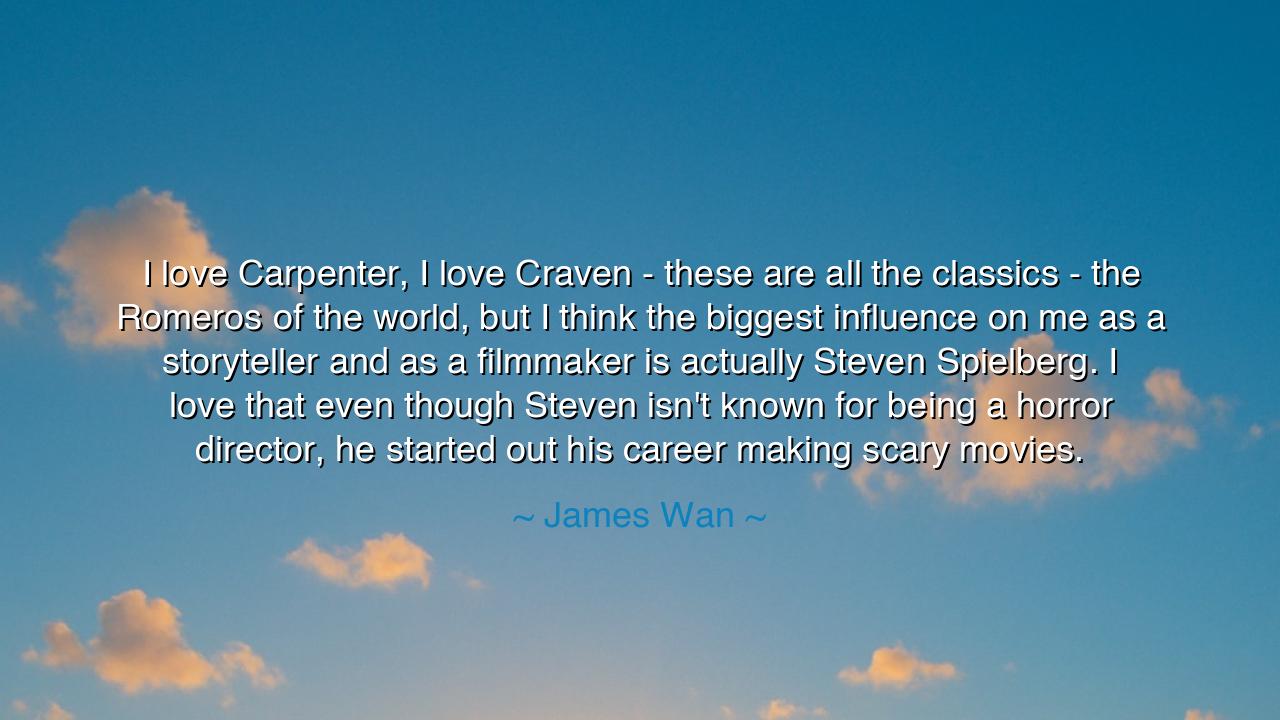
I love Carpenter, I love Craven - these are all the classics -
I love Carpenter, I love Craven - these are all the classics - the Romeros of the world, but I think the biggest influence on me as a storyteller and as a filmmaker is actually Steven Spielberg. I love that even though Steven isn't known for being a horror director, he started out his career making scary movies.






Hear now the words of James Wan, a master of shadows and light, whose confession rings with both humility and reverence: “I love Carpenter, I love Craven – these are all the classics – the Romeros of the world, but I think the biggest influence on me as a storyteller and as a filmmaker is actually Steven Spielberg. I love that even though Steven isn’t known for being a horror director, he started out his career making scary movies.” This utterance is not merely an acknowledgement of teachers and predecessors. It is the voice of a disciple recognizing the unseen hand that shaped his destiny, and in it lies wisdom for all seekers of craft and art.
Wan invokes the names of Carpenter, Craven, and Romero—guardians of terror, heralds of nightmares who carved the path of horror cinema with blood and imagination. They were the ones who gave form to our fears and lent shape to the shadows of the modern age. To say “I love them” is to recognize their throne in the pantheon of storytellers. Yet Wan, though steeped in their legacy, turns his gaze elsewhere—to Spielberg, the great conjurer whose art transcended genre, who clothed awe and terror in the same garment.
Consider the paradox Wan names: Spielberg, not known as a horror director, yet his early steps were drenched in the essence of fear. Duel (1971), the tale of a man hunted by an unseen truck driver, dripped with the dread of the unknown. Jaws (1975), that great leviathan of cinema, did more to terrify humankind of the sea than any myth since the Kraken. Here was a man who showed that horror need not be confined within walls of blood and ghosts. Horror, in Spielberg’s hand, was life itself—vast, uncontrollable, stalking us when we least expect it.
There is an ancient lesson in this. Many a warrior has trained under the shadow of a great general, only to find his truest inspiration in the unlikeliest place. Recall the tale of Alexander the Great, who though taught by the philosopher Aristotle, found equal guidance in the tales of Achilles. His spirit was not limited to the scrolls of wisdom, but reached toward the heroics of myth. Likewise, Wan honors his Aristotle—the masters of horror—yet his Achilles is Spielberg, who infused even terror with wonder, and in so doing revealed that fear and awe are siblings born of the same womb.
When Wan speaks thus, he reminds us that influence is not always linear. One may drink deeply from the well of tradition, yet the spark that lights the torch often comes from an unexpected fire. Spielberg’s gift was not only his command of terror but his marriage of fear with humanity, his ability to guide us through darkness into light. Wan, inheriting this spirit, wove it into The Conjuring, Insidious, and beyond, where horror chills but also uplifts, and where family and love stand as bulwarks against the abyss.
The teaching, then, is this: do not seek only within your chosen field for masters. Look beyond, for greatness often dwells in unexpected quarters. If you are a poet, learn from the sculptor. If you are a warrior, listen to the philosopher. If you are a builder of machines, take lessons from the painter. For in these crossings of paths lies the true growth of the spirit.
And now, beloved listener, let the lesson settle in your heart: revere your ancestors in the craft, but never blind yourself to the wider horizon. The world is vast, and wisdom wears many faces. Let your influences be broad, let your inspirations be diverse, and let your art be a river fed by many streams. In your daily life, walk with open eyes—study not only those who walk your path, but those who stride in parallel. Read outside your field. Listen to voices unlike your own. Seek mentors not only in the expected halls but in the hidden corners of the world.
Thus shall your work gain depth, thus shall your spirit find strength, and thus shall your creations carry both terror and beauty, both shadow and light. For as James Wan has shown, the greatest influence may not always be the loudest name in the temple of your craft, but the one who first taught you to feel—the one who revealed that even fear itself is but another form of wonder.






AAdministratorAdministrator
Welcome, honored guests. Please leave a comment, we will respond soon